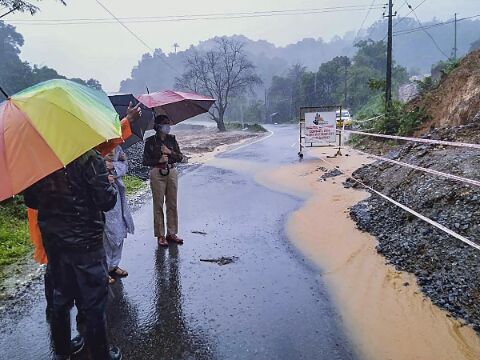Call to action

Like 2020, 2021 has also been a year of weather extremes with climate change being a clear link in the tragedies. In recent months, even as heavy rains have hit parts of India, Western Europe and China, record-breaking heatwaves have swept North America and Russia. Both of these weather extremes are thought to be related to a warming climate. Heatwaves aside, even extreme rainfall is linked to global warming as heat increases the moisture carrying capacity of the air. This leads to the formation of something known as 'convective clouds' that produce an extreme amount of rainfall in a relatively short period. Studies done by the Indian Institute of Tropical Meteorology show that Delhi used to record around 15-20 days of rain on average every year during the 1980s and 1990s. Now, the capital records around 8-10 days of rainfall. Despite being shorter and starting 16 days late for the capital region, Delhi quickly experienced a surplus of rainfall when it finally came. Roads, footpaths and underpasses were quickly inundated and there were at least two deaths last week attributed to the extreme rainfall in the national capital. Elsewhere in India, things are decidedly worse. Extreme rainfall caused floods and landslides in Maharashtra that killed 149 people by Monday. Over two million people were evacuated in the affected areas of the state. One of the affected districts, Ratnagiri broke a 40-year-old-record for the most rainfall in the region in July with IMD recording 1,781 mm of rain between July 1-22. The average July rainfall for the district is usually around 972 mm. Experts say that such extreme rainfall events will only become more likely in the future. Able to cause urban flooding and landslides within minutes, such events will be more erratic and thus, harder to predict. These events have taken countries by shock and have shown gaps in early warning systems that have proven deadly. Both in Europe and in China, recent floods have shown patterns of poor official messaging and complacency leading to loss of life as warnings of such extreme rainfall events were not taken seriously enough. In Zhengzhou, the provincial capital of Henan, China, 12 people died due to flooding in the subway stations which were still operational when the floods came despite the local weather station issuing red alerts for torrential rains 18 hours in advance. Being prepared seems even more vitally important as climate change disasters become more frequent. In the recent European floods, it was a difference in preparation that saw the Netherlands survive the floods with zero reported deaths even though the River Meuse broke high flow records. Changes required to tackle such extreme weather events can range from measures such as widening river channels to changing how rainfall is tracked. With heavy rains coming in short, erratic patterns, it no longer makes sense to simply rely on daily data for rainfall. More importantly, proper organisation is key. In the Netherlands, water management is undertaken on both a local and national level to coordinate action against everything from wastewater to flood water. There will also need to be a rework in how cities and towns are built and kept safe from urban flooding as increased urbanisation will lead to more floods as well. More concrete means that rainwater has less area to percolate into the ground leading to floods forming more easily. These are more short-term and urgent fixes. The long term perspective is that the promised climate change disaster is already well underway and governments worldwide are being confronted by the reality that there is simply not enough time to wait. While many economies worldwide would prefer to strongly rebound from the economic devastation of the pandemic by redoubling industrialisation and urbanisation, a conversation over the sustainability of human economic activity and general ways of life has never been more relevant. Simply touting climate change ambitions to give the illusion of progress without substantive work and investment to back it up is now even more egregious wrongdoing on the part of world leaders that are averse to committing to large scale changes. Unless humanity aims to keep contending with an ever more hostile and unlivable planet ravaged by climate change, it is well past time to start confronting the climate change crisis as the greatest existential threat humans have faced to date.



